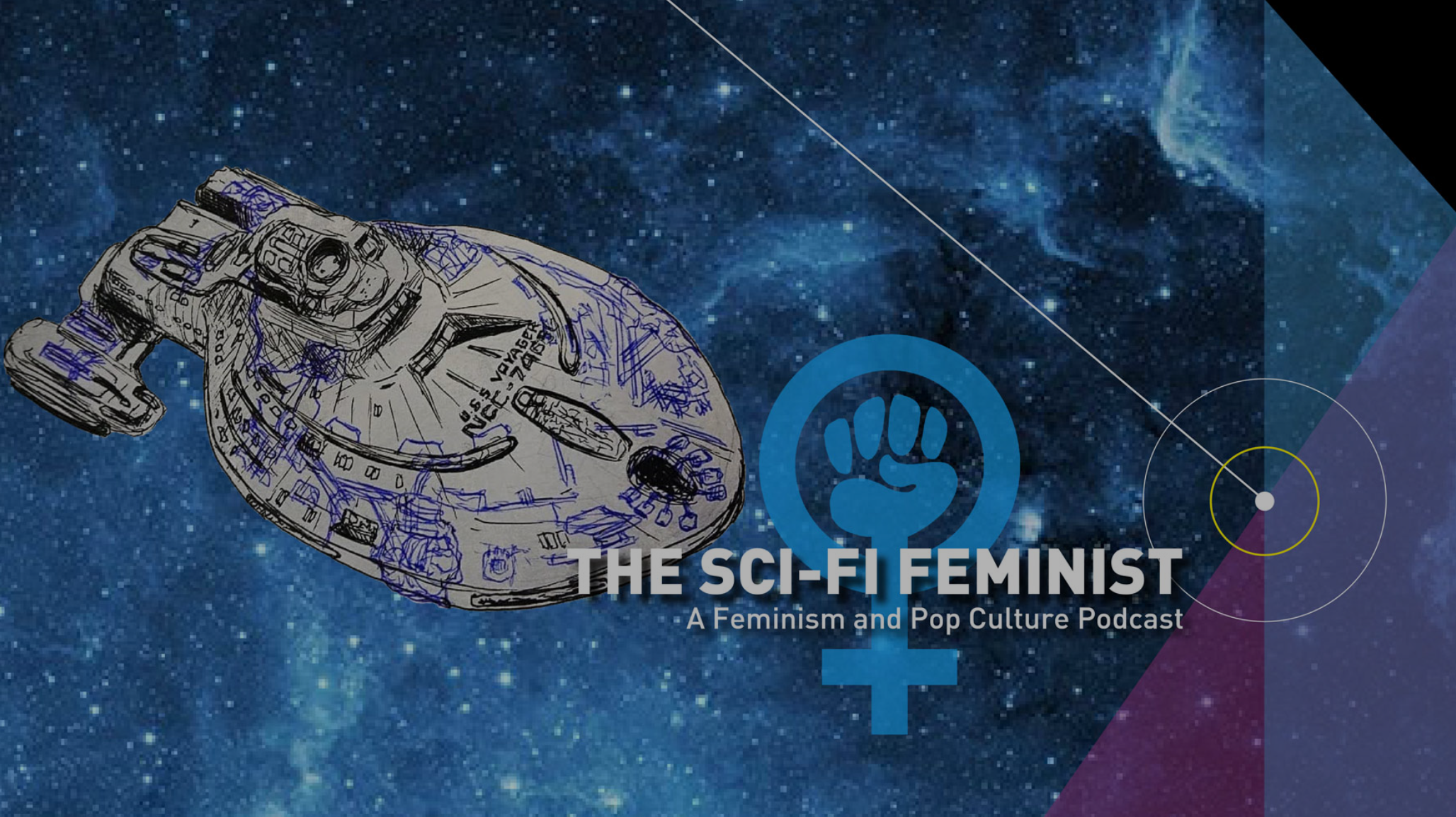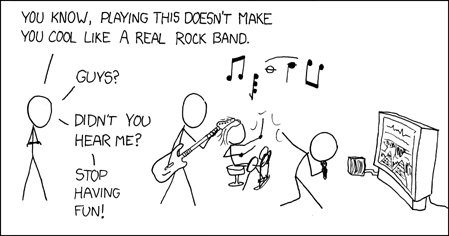
7 Questions for The Sci-Fi Feminist
January 28, 2024
Two weeks ago, I was aimlessly scrolling through Reddit (as one does) when I stumbled upon a post about The Sci-Fi Feminist, a blog and podcast with an excellent name. I connected with its author and we decided to mutually guest-post to introduce on each other to our audiences. In the entry below, everything in red was written by The Sci-Fi Feminist. To see my answers to these questions, you'll just have to head over to The Sci-Fi Feminist! Without further ado...
Welcome, guest contributor! Can you please introduce yourself and summarize what your project is?
My name is Janine Engelbrecht, and I am a lecturer and academic at a creative institution called The Open Window - I teach and manage the Film Theory course there. I did my Master's degree on the transformation of the video game heroine, Lara Croft, from the 1990s to the 2010s, and broadened the study during my doctorate degree. In my PhD thesis, I identified a new heroine archetype that has emerged and theorised* where this archetype fits in the context of feminism.
Following my PhD I was pretty tired of academic writing, but really love my research, so I started the Sci-fi Feminist podcast and blog to share my research in an easily accessible way to the rest of the world.
(*Note: Dr. Engelbrecht is based in South Africa, hence the non-American spelling.)
How did you get into the field of feminist media blogging?
During COVID, I was stuck in front of my computer all day, working on my PhD and various research articles. It goes without saying that I became pretty tired of academic writing and wanted to do something on the side to relieve stress while still being of interest to me, so I started the blog as a side project. To my surprise, blogging about my research helped organise my thoughts and helped me finish up my PhD when I look at it in retrospect.
My blog was a way of therapy and relaxation for myself during COVID times, but the reason I started my research on the topic of feminism and representation in pop culture, which is the main topic of my blog, is a much longer story. Towards the end of 2015, I went through a sort of a depression after three years of studying Fine Arts. In the holiday of 2015, Rise of the Tomb Raider was released, and playing as Lara Croft in that game made me feel really strong and empowered.
When 2016 arrived, I had to do a year-long art project for the final year of my degree. So I had a grand idea: I decided that maybe if I dress up as Lara Croft for an entire year, my personality will change and I will become strong, confident and capable like her. So that is what I did - I made all her costumes and wherever I went for the entire 2016, I would dress up as her. When I came to the end of the year, I was even more lost and distraught than I was in the beginning of the year.
At that time I realised that dressing up as a character that does not, in any real sense, exist is not enough for me to solve the problems I faced as a woman in my everyday life. From that time on I started critiquing these images in the media, as I found that they show us idealised versions of femininity that aren't attainable.
Why do you focus on scifi?
My intention was never to focus on sci-fi specifically - like I mentioned, my initial study was on action/adventure video games. Nevertheless, the more I got into my research, the more I realised that most of the strongest and most influential female characters on screen came from the sci-fi genre, like Ellen Ripley from Alien, Sarah Connor from Terminator and my personal favourite, Captain Kathryn Janeway from Star Trek [Voyager].
I realised this is the case because sci-fi exists in a liminal space - a hypothetical future that is realistic enough to be true, but far enough in the future to not be threatening to our current status quo - the ideal breeding ground for super subversive characters. So the sci-fi genre is not necessarily "feminist", but because of its unique ideological position, it allows feminist characters to exist within it quite comfortably.
Who is your favorite female character on screen and why?
This is very difficult for me to say, because there are so many that I fell absolutely in love with: Ellen Ripley, Sarah Connor, Seven of Nine, Emperor Georgiou, Lara Croft, Major Motoko Kusanagi - the list goes on and on. There is one that stands out above them all though, and that is Captain Kathryn Janeway from Star Trek: Voyager. The first year of my PhD was very difficult, not because of the research, but because my best friend was fighting breast cancer that year. She had to go to South Korea for treatment and so I could not even help her or see her and I felt really powerless because of the whole situation.
That year I was writing the chapter on Ellen Ripley, Sarah Connor and Captain Janeway, and so I was watching Voyager every moment I had a chance - I think I watched all seven seasons twice that year alone. I received so much strength from Captain Janeway's unwavering leadership, strong moral compass, and compassion for her crew. Her predicament of being stranded in the Delta Quadrant also spoke to me on a deep level; I felt like I was stranded with her and that we were navigating our way home together.
Apart from this personal connection, Captain Janeway, in my opinion, also embodies the best of both masculinity and femininity - she is motherly and caring when needed, but also very dominating, brave, and even reckless at times (I am aware that these characteristics are not inherently masculine nor feminine, but you get what I am trying to say). She is, simply put, the perfect character and I still go to her when I feel lost or stuck.
Are you a feminist killjoy, shouting at people to stop having fun? If not, what is your call to action for feminists and their allies?
I used to be a feminist killjoy, but as I matured I realised that being upset about things that I can't change is exhausting. In fact, despite being utterly shocked by Lara Croft's representation in the early Tomb Raider games (with her huge breasts, thin waist and big butt), I really enjoy playing those games even now. The same goes for characters like Seven of Nine from Star Trek: Voyager, who is similarly sexualised, but remains one of my most beloved characters in the Star Trek universe.

(Pictured: xkcd 359. Not pictured: what we do.)
What I would like for feminists (or people in general) to realise is that what we see on screen are simply representations that reflect society's current ideals of femininity - and that these ideals also change every few decades. Even though we might love (or hate) these representations, they should not impact the way we view ourselves as women. You don't look like Lara Croft, and that's okay. We should not internalise these myths of femininity, but be able to look at them critically and see them for what they are.
Do you find that feminist criticism of the media is impacting women's representation on screen in a positive way? Is it a futile endeavor?
It is definitely making a positive impact on the representation of women in the media. I believe this conversation started with Laura Mulvey's criticism of the male gaze in 1975 and has never stopped. While there were (and are still) stereotypical and harmful representations of women on screen, there is clearly a conscious shift taking place in terms of representation. One prime example is Lara Croft, who went from being what some called a "cyber bimbo" to an action heroine that is not sexualised, that is more realistic, and that is not overly reliant on her father. I would say this is thanks to feminist criticism of what we see on screen, but also feminist criticism of women's role in the creation of these images. For example, the "new" version of Lara Croft was written by women (Rhianna Pratchett and Jill Murray).
In terms of the representation of black and Asian women, and LGBTQ people too, there is a conscious effort in attempting to show previously marginalised identities on screen, especially in franchises like Star Trek. So we should not stop, but keep fighting the good fight!
In one sentence, what do you hope your readers take away from your writings?
Women should be informed of the ideological underpinnings of representations of themselves on screen and be able to discern representation - what society says we should be - from reality - the way things are in the everyday lives of women.
Thanks to Janine Engelbrecht for these thoughtful answers. Find out more about her project at https://thescififeminist.blog/. As always, keep your sexy lamps burning.